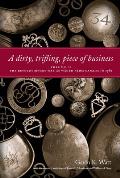

|
 |
|
This article on Loyalist families is presented in 8 parts. Click below to skip to:
Part 1 - Introduction |
Female Ancestors |
|
A Variety of Hardships Women in all theaters of the war helped the British forces in a clandestine manner, often suffering imprisonment for their services. In the North, Robert ROBINSON, a soldier in the 1st Battalion, King's Royal Regiment of New York, left his family behind in Johnstown, Tryon County, but they were hardly inactive. He would later write: ...the Rebels plundered his House &c. out of which they turned his wife and three Children and took up his wife and had her in Custody some time on Suspicion of her Conveying Intelligence to the Royal Army and Harbouring Spyes &c &c as there were two Loyalists taken up at his Said House, who were accused for Said Crimes.10 Some women had been victims of previous conflicts but were involved anew, such as Sarrah McGINN of up-state New York: That your petitioner, Widow of Captain McGINN who was killed last War; under the Command of the late Sir Willm. JOHNSON Bart. near Lake George, and who has a Son (Being her only Son now living) Lieutenant in the Six Nation Departmt. that was wounded in the Knee in this unnatural Rebelion, & his having a helpless Family renders him unable to give her any assistance she is aged & very infirm & The Rebels have destroyed, plunder'd and taken almost all her property; because they alledged (and not without reason) that she was tampering with the Indians in favour of Government. In contrast to the extreme hardships encountered above, a more typical upstate New York family was that of Mary SWORDS. Her husband had served in the French and Indian war as a lieutenant in the 55th Regiment of Foot, afterwards settling on a farm and Potash works in Saratoga. He was quickly apprehended at the beginning of the war and sent to jail in Albany, and later Connecticut, as a dangerous person. On the advance of Burgoyne's army towards Albany in 1777, Rebel troops and Indians in the British service plundered the farm of all its furniture, leaving Mary only her clothing. Even in this distressed situation, she managed to supply the British Army with forage and nine head of cattle. Her and her family were turned out of their homes after Burgoyne's surrender and forced to remove within the British lines at New York. Her son would later go on to become a subaltern in the Loyal American Regiment, fighting at Stony Point in 1779 and under Brig. General Benedict ARNOLD in Virginia in 1781, where he would die from wounds sustained in action.12 Life was no less difficult for Loyalist families in the Middle Atlantic States. In all the towns and villages throughout this area was a network of "safe-houses" where Loyalists and British Soldiers on the run could find safety and a hot meal, while they made their way from Rebel prisons in the hopes of reaching New York safely. One British sergeant of the 47th Regiment of Foot who escaped in 1781 noted no less than 65 households that assisted him in Maryland, Delaware and Pennsylvania alone. The same summer twenty five Convention Soldiers came in through Pennsylvania in a body safe to New York City. One of the women who was assisting in this work was Ann NEVIL of Sussex County, New Jersey. She told her story to the British in 1779: That Petitioner being always loyally Inclined to Exert herself Respects Attending his Majesty King Georges Intrests or Subjects--last December went from Sussex County to New York as Pilot with part of General BURGOINs Men some time was Suspected by the Rebels to be the most Notorious Malafacter Imaginable. Her case was confirmed by Lieut. Colonel Joseph BARTON of the New Jersey Volunteers, also of Sussex County, and she was allowed provisions as other refugees were.14 While Ann NEVIL was most probably a member of the lower class, all levels of wealth and social standing were represented in aiding the Crown's cause. Students of the Loyalists may be aware of the exploits of Brigadier General Cortland SKINNER of the New Jersey Volunteers, but few are aware of his wife's. In support of this woman, Major General William TRYON wrote: I do Certify that Mrs. Elizabeth SKINNER, did keep up a secret correspondence with her husband, General SKINNER, while he was obliged to remain with me on board a ship in New-York harbor, & Sandy hook & conveyed the most material intelligence of the designs, & conduct of the Enemy, that we received. One of the terrible worries suffered by many Loyalists was that their actions would cause punishment, harm, or worse upon their families at home. In an age when protection for a family was most often found in the father with a loaded musket, the absence of that weighed heavily on the minds of many. John STUART, a West Jersey Loyalist, spent the early part of the war ferrying in recruits for the Provincial Corps and Rebel deserters into the British lines. He was eventually taken prisoner (six times, actually), and suffered terrible news upon his release to New York: That on your Memorialists being obliged to leave his family they were exposed to every ill usage, his wife so much that she suddenly dropped dead at her door when a party came to seize on his Effects which notwithstanding the shocking spectacle before them they immediately did and left his three small Children without any support, who were afterwards put out to Servitude and your Memorialist after considerable difficulty and expence got them released from their Bondage and to him their only remaining Parent at New York.16 A more direct result of being an active Loyalist occurred to the family of Joseph ROBINSON. Joseph and Lilley ROBINSON were "very comfortably settled" on a considerable farm in South Carolina at the commencement of the war. Joseph became involved in the troubles of Ninety Six District and was taken prisoner by the Rebels. He was carried to North Carolina, often threatened with summary execution. Not wishing to stick around and find out if the threats were real, he escaped into the woods to make his way home. Figuring the way to get him back was through his wife, they immediately took her up. In Lilley's words: ...it being known that he was hiding in the Wilderness near to his House, waiting for an Opportunity to join the Friends of the British, the Rebels in 1776 carried your Petitioner away Prisoner and kept her close confined for several days, and caused it to be made known to your Petitioner's Husband that if he would return to his Plantation and remain neuter, his wife should be restored to him, and he should not be further molested, and using dreadful threats if he did not comply, upon which your Petitioner's Husband returned to his House, and your Petitioner was set at liberty-
10 Memorial of Robert Robinson, ca1784. Great Britain, Public Record Office, Audit Office, Class 13, Volume 80, folio 202.
Click here for ---> Female Ancestors Main Page Refugees & Others: Loyalist Families
The On-Line Institute for Advanced Loyalist Studies Copyright Restrictions Document Formatting Optimal Viewing |
 by Angela Elwell HuntHardcover
by Angela Elwell HuntHardcover